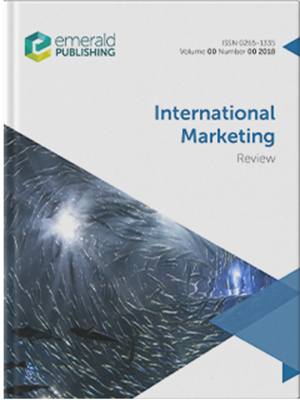The power of institutions on international marketing: reflections on the COVID-19 pandemic can inform international marketing activities
IF 4.6
3区 管理学
Q1 BUSINESS
引用次数: 5
Abstract
PurposeThe COVID-19 pandemic highlights the influence that nation-states can have on the engagement of international marketing activities. The purpose of this study is to understand the influence of the institutional response to the COVID-19 pandemic on international marketing activities and to highlight the need to formally incorporate institutional economics into the study of international marketing phenomena.Design/methodology/approachThe paper uses institutional economics as the environmental element of the general theory of competitive rationality to present a foundation for understanding how state actions influence marketing and international marketing activities. Data are presented and empirically tested, demonstrating the heterogeneity of government influence on personal and economic freedoms during the pandemic, both of which influenced international marketing activities. To broaden the implications of this work, we also provide anecdotal illustrations unrelated to the COVID-19 pandemic to demonstrate the breadth of nation-state influence on international marketing activities.FindingsHeterogeneity in nation-state formal and informal institutional elements influence international marketing activities during the COVID-19 pandemic. However, other incidents, unrelated to the COVID-19 pandemic, demonstrate the importance of contextualizing international marketing activities under a holistic institutional framework.Originality/valueThe paper employs the general theory of competitive rationality along with institutional economics to provide a theoretical foundation to better understand the differential impact on international marketing as a result of formal and informal institutional influences. This general framework can be employed to provide a holistic understanding of both international and cross-national marketing activities.机构对国际营销的力量:对COVID-19大流行的反思可以为国际营销活动提供信息
目的新冠肺炎疫情凸显了民族国家对参与国际营销活动的影响。本研究的目的是了解机构应对新冠肺炎疫情对国际营销活动的影响,并强调有必要将机构经济学正式纳入国际营销现象的研究。设计/方法论/方法本文将制度经济学作为竞争理性一般理论的环境要素,为理解国家行为如何影响营销和国际营销活动奠定了基础。数据经过展示和实证检验,证明了疫情期间政府对个人和经济自由影响的异质性,这两种影响都影响了国际营销活动。为了扩大这项工作的影响,我们还提供了与新冠肺炎大流行无关的轶事插图,以展示民族国家对国际营销活动的广泛影响。发现新冠肺炎大流行期间,民族国家正式和非正式制度要素的异质性影响着国际营销活动。然而,与新冠肺炎疫情无关的其他事件表明,在整体体制框架下将国际营销活动背景化的重要性。独创性/价值本文将竞争理性的一般理论与制度经济学相结合,为更好地理解正式和非正式制度影响对国际营销的差异影响提供了理论基础。这一总体框架可用于提供对国际和跨国营销活动的全面理解。
本文章由计算机程序翻译,如有差异,请以英文原文为准。
求助全文
约1分钟内获得全文
求助全文
来源期刊

International Marketing Review
BUSINESS-
CiteScore
8.70
自引率
12.00%
发文量
55
期刊介绍:
International Marketing Review (IMR) is a journal that has, as its core remit, the goal of publishing research that pushes back the boundaries of international marketing knowledge. IMR does this by publishing novel research ideas, and by publishing papers that add substance to, question the basic assumptions of, reframe, or otherwise shape what we think we know within in the international marketing field. IMR is pluralistic, publishing papers that are conceptual, quantitative-empirical, or qualitative-empirical. At IMR, we aim to be a journal that recognizes great papers and great research ideas, and works hard with authors to nurture those ideas through to publication. We aim to be a journal that is proactive in developing the research agenda in international marketing, by identifying critical research issues, and promoting research within those areas. Finally, IMR is a journal that is comfortable exploring, and that fosters the exploration of, the interfaces and overlaps between international marketing and other business disciplines. Where no interfaces or overlaps exist, IMR will be a journal that is ready to create them. IMR’s definition of international marketing is purposefully broad and includes, although is not restricted to: -International market entry decisions and relationships; -Export marketing and supply chain issues; -International retailing; -International channel management; -Consumer ethnocentrism, country and product image and origin effects; -Cultural considerations in international marketing; -International marketing strategy; -Aspects of international marketing management such as international branding, advertising and new product development.
 求助内容:
求助内容: 应助结果提醒方式:
应助结果提醒方式:


